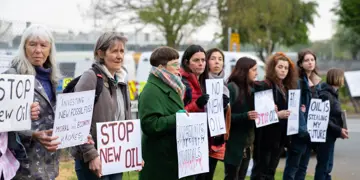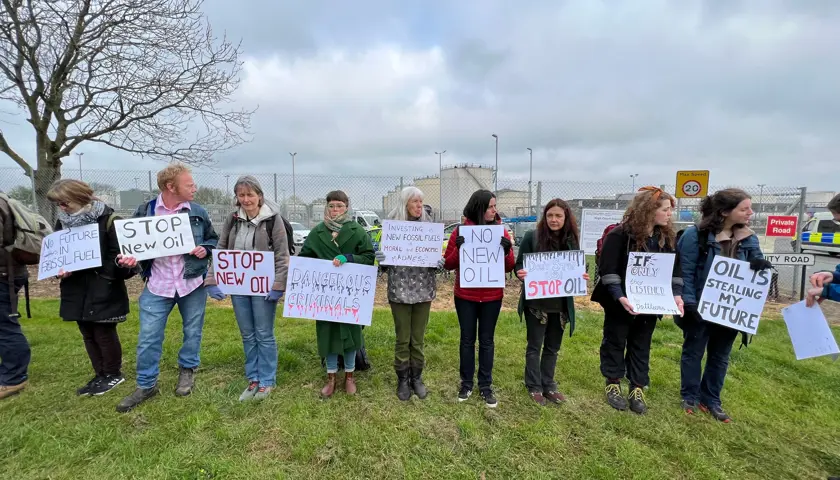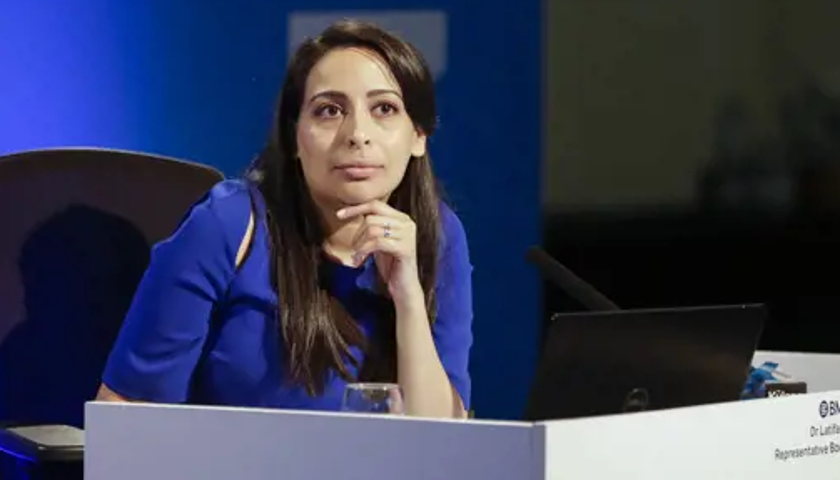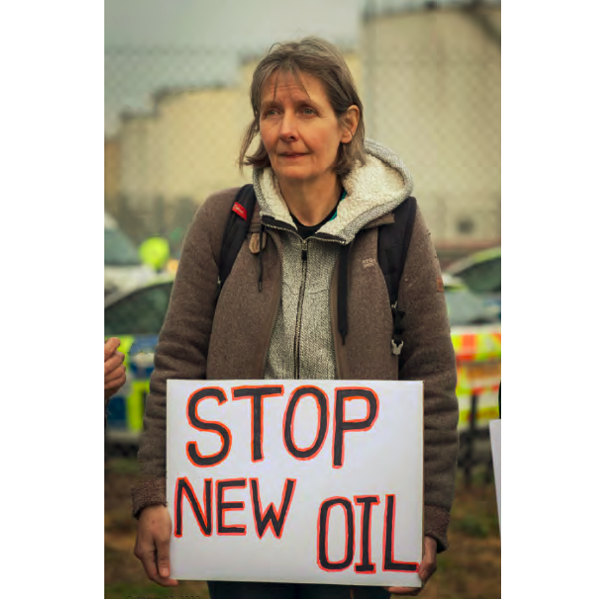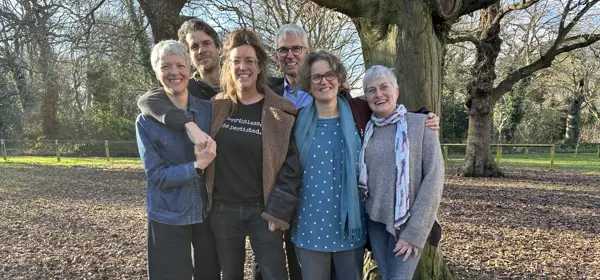'Moral duty'
'Moral duty'
GP and environmental activist Sarah Benn says her five-month suspension makes no sense and may deter others – but not her – from peaceful protest
‘The patient may look OK, but if you don’t spot signs like their heart rate creeping up and recognise the ongoing harm, they will crash. All of a sudden, you’ve got a moribund patient with no reserves. That’s it. Everything’s exhausted. Things go downhill really fast and you do everything you can to stabilise them.
‘You might have to open them up and ligate the bleeding vessel. If you don’t do that, disaster happens – that’s where we are heading with the planet.’
Sarah Benn compares the Earth’s trajectory through a globally recognised climate emergency with the early signs of serious blood loss, something ‘all medics have been taught’ to anticipate.
The GP of 32 years has just had her GMC registration suspended for five months after a Medical Practitioners Tribunal Service hearing found her environmental activism amounted to misconduct because it led to her breaching a court order.
In her submissions, Dr Benn urged the tribunal, and the GMC’s counsel, to consider her criminal actions – breaching an injunction by sitting in the road and holding a placard by an oil terminal, in protest at its continued burning of fossil fuels – as an exceptional circumstance, one that does not affect her ability to practise as a clinical doctor.
Dr Benn believes the tribunal’s conclusion that her ability to practise has been ‘impaired’ because she served 32 days in prison for contempt of court is misguided.
She asked the tribunal – which raised ‘no clinical concerns’ – to take no action against her at all but suggested that if the panel truly believed her actions were ‘unbefitting a registered doctor’, they should erase her name from the medical register altogether.
Protests
The BMA believes the ruling sends a ‘worrying message’. Latifa Patel, chair of the representative body, says: ‘Dr Benn’s actions and her resulting custodial sentence posed no threat to patients, but her suspension implies they do. It is now time for the GMC and the medical profession to review the basis on which Dr Benn found herself in front of a medical tribunal.’
Dr Benn, who retired from clinical practice in 2022, will face a review process before the end of her suspension, at which point she will either have it revoked, extended or her registration erased altogether.
She told The Doctor how she feels the GMC is blindly following processes, rather than thinking critically about the issue, and has ‘missed an opportunity to do something brave and decisive’ by treating her case differently.
‘These procedures are not fit for purpose in this situation,’ she says. ‘I haven’t acted for personal gain. I have done what I’ve done out of desperation. I didn’t want to break the law, but I feel that I had to do something. It was deemed sufficiently serious that I ended up in prison.’
Dr Benn joined a peaceful Just Stop Oil protest within a buffer zone at Kingsbury Oil Terminal on 26 April 2022 by ‘spreading out and sitting down across the road’, breaching an injunction which amounted to contempt of court. She was released on bail.
She returned to the terminal for another peaceful protest on 4 May 2022, this time standing on a grass verge at the side of the entrance holding a placard. This breached her bail conditions and resulted in eight days on remand in custody.
On 14 September 2022, Dr Benn attended another peaceful protest at Kingsbury, this time ‘sitting down on the road and blocking vehicular access’. As a result, she was jailed for 32 days.
She self-referred to the GMC over these incidents, as she had for previous incidents in 2019; over a public-nuisance charge in connection with the activist group Heathrow Pause, and as part of Doctors for Extinction Rebellion action, glueing herself to a government building and twice obstructing a highway.
Her actions in 2019 resulted in conditional discharges and a resulting GMC investigation was closed with advice given to her to ‘reflect’ on her actions.
This time round, the GMC brought proceedings as a result of another court’s findings and accused Dr Benn of bringing the medical profession into disrepute by not acting within the law, therefore risking public trust in, and respect for, doctors ‘who are held to a higher standard of conduct and behaviour’.
Dr Benn’s actions and her resulting custodial sentence posed no threat to patients
Dr Patel
In its submissions, the GMC argued Dr Benn’s conduct ‘needed to be marked to show that it was unbefitting of the profession’. And while the tribunal decided she does not present a risk to patient safety it concluded action was needed ‘to maintain public confidence in the profession’.
Suspension, it said, is ‘not intended to punish’, and ‘nor is it a response to Dr Benn’s expression of her views or to her undertaking protest action as a matter of social conscience’. Rather: ‘It is a consequence of Dr Benn’s misconduct and the impairment of her fitness to practise arising out of her repeatedly acting outside of the law.’
The tribunal noted how Dr Benn ‘made no apology for her actions in breaking the law’, rejected remediation and ‘stated that she would continue with her actions’, which they argued had affected police resources.
Taking no action, the panel said, would have been ‘inappropriate and insufficient’ and risked damaging public trust in doctors. However, it accepted Dr Benn is a ‘very experienced doctor’ with ‘positive testimonials’ and fully engaged with the tribunal process.
Evidence-based
Dr Benn spent most of her career as a partner at an inner-city GP practice in Birmingham, moving to a part-time salaried role in 2017 owing to burnout. She worked as a GP appraiser and for the Worcestershire COVID Management Service during the pandemic.
She relinquished her licence to practise in 2022 and has since devoted her time to environmental activism and voluntary work. She became involved with Extinction Rebellion in 2019 before which she says she had ‘a rather conformist personality with a dislike of breaking rules’.
In her submissions, Dr Benn said she had a ‘moral duty’ to take action to protect life and health in the context of a severe threat owing to climate breakdown – and pointed to extreme scientific alarm about the climate crisis.
She argued this was a fact, not a passionate belief, citing bodies such as the UN, the Centre for Climate Repair at Cambridge University, The British Medical Journal, and The Lancet.
‘As an undergraduate and a practising doctor, I was trained in evaluating evidence and was expected to be guided by such evidence,’ she said in her witness statement.
Dr Benn argued the climate emergency, declared by the UK parliament in 2019, is also a health emergency – so staying quiet would be failing in her obligations under the GMC’s Good Medical Practice code of conduct to make patients’ health her first concern.
Taking non-violent direct action, she added, has a ‘long and effective history’ – referencing the likes of the suffragettes who ‘were reviled in their time, but are almost universally celebrated as heroes now’.
She added that what is deemed acceptable changes over time, giving the example of homosexuality by referencing the GMC’s recent formal apology for its historic regulatory action linked to homosexuality, when it said ‘times have changed and so have we’.
Dr Benn also submitted that doctors’ roles can be to guide patients through unfamiliar terrain of scientific facts versus opinion, such as anti-vaccination conspiracies, and to deliver bad news.
Further, she argued that most people would not conclude that because one doctor went to prison for protesting about climate change that all doctors are untrustworthy, and that she was aware of no patients who had complained about her professionalism owing to her activism, something she discussed with them ‘rarely’.
'Worrying' ruling
Dr Benn told The Doctor that, while people react with surprise to her actions because they often think ‘doctors do not do that sort of thing’, many people take what she says more seriously because she is a doctor, and this applied to those she met while in prison.
Having reflected on her previous punishments, as she was asked to by the GMC, Dr Benn says her conclusion was that the use of civil law to quash peaceful action is ‘manifestly not a good, moral and just use of the law’, and quoted the UN’s special rapporteur Michel Forst who has said he is ‘deeply troubled at the use of civil injunctions to ban protest in certain areas’.
Dr Benn says she is ‘worried’ that the ruling will put other doctors off engaging in peaceful activism over the climate emergency – and other causes they care about – because of the seriousness of her sanctions.
That said, she believes her tribunal shows the GMC has ‘no issue with me protesting about climate change’, only that it had led to criminal convictions, and pointed to its guidance on taking part in protests which says ‘doctors are entitled to their own personal political opinions’ and that the GMC should make decisions ‘based on the specific facts of the case’.
Dr Benn says she is more worried about fellow doctors who face similar hearings than her own sanctions, because she has retired from clinical practice.
She urged fellow doctors to take a level of action they feel comfortable with in support of causes they care passionately about, emphasising that her hearing and suspension came about because she ‘took it further’ by committing contempt of court – not because she stood up for what she believes in.
And while the risk of a longer prison term is a consideration on what further action she might take, Dr Benn says she will not rule out breaking the law again if she decides it will be beneficial to her cause.
She flipped the GMC’s argument – that doctors should be held to a higher standard of conduct and behaviour than those in unregulated professions – on its head, saying that is precisely why she is taking a stand.
Trust is not justified in a doctor who is aware of catastrophic risk to life and health yet makes no concrete effort to address this
Dr Benn
‘If I choose to stay quiet, I am failing in my obligations. What would you have me, and other health professionals, do when we know of this terrible thing barrelling down the road towards us, and no-one with the power to stop it is choosing to listen?
‘Trust is not justified in a doctor who is aware of catastrophic risk to life and health yet makes no concrete effort to address this because it is too difficult, or seems too complex to even try.
‘As doctors we hold a respected and privileged position in society with corresponding expectations to do our duty – to protect patients, the wider public, and especially the most vulnerable.
‘I would love there to be a different way that seemed to me to have any plausible chance of getting us out of [climate] trouble, but I just don’t see it.
‘There is no medicine on a dead planet, where there would be no tribunals and no GMC.’


